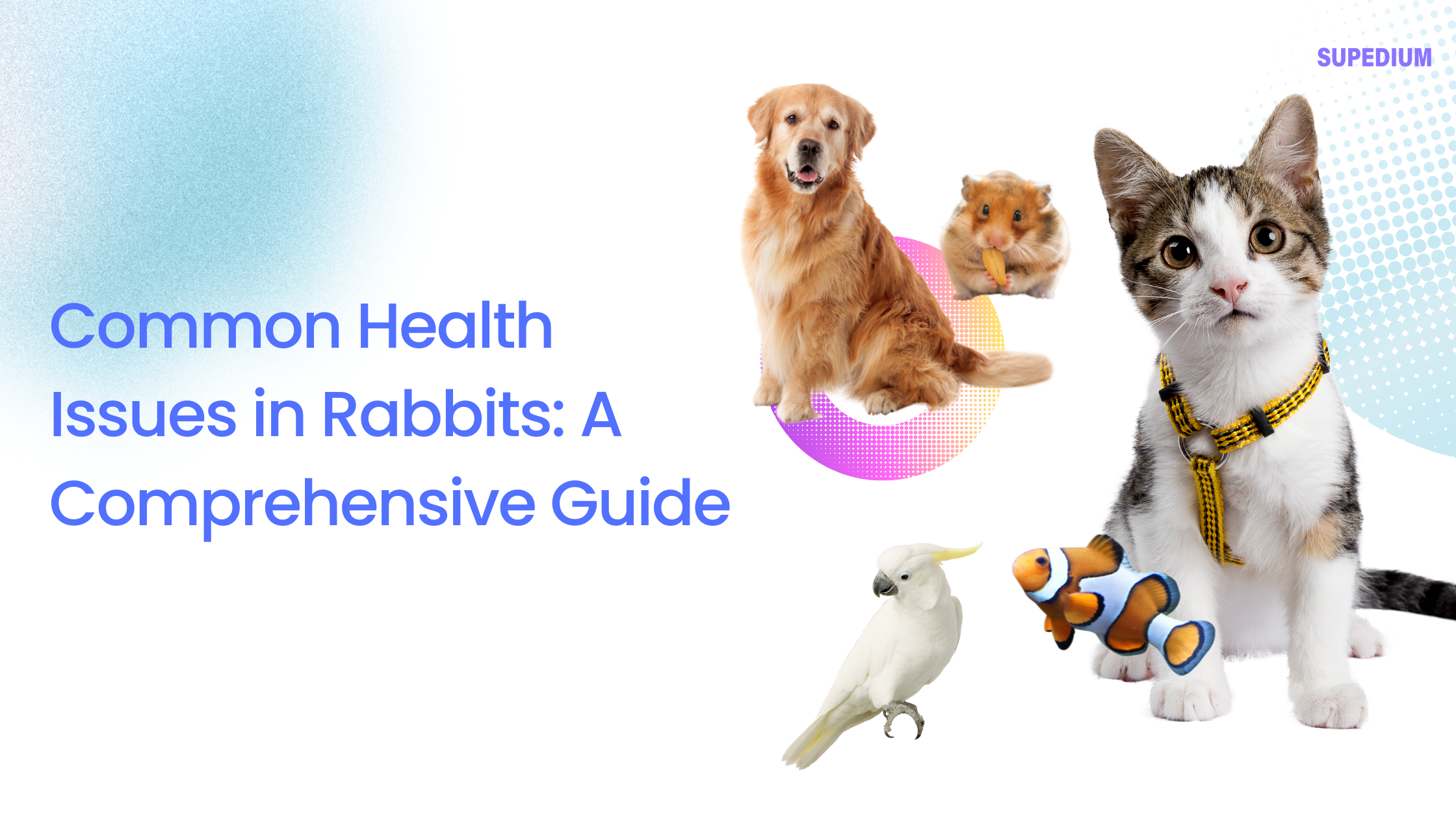Table of Contents
![]()
Rabbits are delightful pets known for their gentle nature and unique behaviors. However, like all animals, they are susceptible to various health issues that can impact their well-being. Understanding these common health problems is crucial for any rabbit owner to ensure their pet’s health and happiness. This article provides a detailed overview of common health issues in rabbits, their symptoms, treatments, and preventive measures.
Digestive Issues
Gastrointestinal Stasis (GI Stasis)
Gastrointestinal stasis, or GI stasis, is a serious condition where the rabbit’s digestive system slows down or stops. This can be caused by several factors including stress, dehydration, or abrupt dietary changes. Symptoms of GI stasis include a noticeable decrease in appetite, reduced stool production, and lethargy. Treatment often involves fluid therapy to combat dehydration, dietary adjustments to promote digestion, and medications to stimulate gut motility. Preventative measures include maintaining a consistent diet, ensuring proper hydration, and providing ample opportunities for exercise.
Diarrhea
Diarrhea in rabbits is often a sign of an underlying issue such as dietary changes, infections, or parasites. Symptoms of diarrhea include loose or watery stools, signs of dehydration, and weight loss. Treatment typically involves rehydrating the rabbit, modifying its diet to include more fiber, and administering medications if necessary. Preventing diarrhea involves stabilizing the rabbit’s diet and monitoring for signs of stress or infection.
Dental Problems
Rabbits’ teeth grow continuously, making dental health a crucial aspect of their overall well-being. Common dental issues include overgrown teeth and malocclusion (misalignment). Symptoms of dental problems are difficulty eating, drooling, and weight loss. Treatment generally involves dental trimming performed by a veterinarian and adjustments to the rabbit’s diet. Preventive measures include providing chew toys to naturally wear down the teeth and scheduling regular veterinary check-ups to monitor dental health.
Respiratory Issues
Upper Respiratory Infections (URIs)
Upper respiratory infections are common in rabbits and can be caused by bacteria, viruses, or environmental factors. Symptoms of URIs include sneezing, nasal discharge, and eye discharge. Treatment usually involves antibiotics and supportive care to help the rabbit recover. Preventing URIs involves maintaining a clean living environment and avoiding overcrowding.
Pneumonia
Pneumonia is a more severe respiratory condition often developing as a complication of URIs or due to poor ventilation. Symptoms include difficulty breathing, coughing, and lethargy. Treatment for pneumonia involves antibiotics, supportive care, and improving ventilation in the rabbit’s living area. Preventive measures include regular health checks and maintaining good environmental hygiene.
Skin Issues
Fleas and Ticks
Fleas and ticks are parasites that can cause significant discomfort to rabbits. Symptoms include itching, hair loss, and visible parasites on the fur. Treatment involves using appropriate anti-parasitic treatments prescribed by a veterinarian. Preventive measures include regular grooming and maintaining a clean living environment.
Ear Mites
Ear mites are tiny parasites that infest the ears of rabbits, causing intense itching, dark discharge, and head shaking. Treatment typically includes topical or systemic medication to eliminate the mites. Preventing ear mite infestations involves regular ear inspections and maintaining good hygiene.
Abscesses
Abscesses in rabbits are localized infections that form pus-filled swellings. They can be caused by bacterial infections or injuries. Symptoms include swelling, pain, and discharge from the affected area. Treatment usually requires surgical intervention to remove the abscess and antibiotics to address the infection. Preventing abscesses involves proper wound care and avoiding fights or injuries.
Urinary Issues
Bladder Stones
Bladder stones are hard mineral deposits that can cause significant discomfort and health issues in rabbits. Causes include diet, genetics, and dehydration. Symptoms of bladder stones include difficulty urinating, blood in urine, and frequent urination. Treatment often involves surgical removal of the stones and dietary changes to prevent recurrence. Preventing bladder stones involves ensuring proper hydration and providing a balanced diet.
Urinary Tract Infections
Urinary tract infections (UTIs) in rabbits can result from bacterial infections or poor hygiene. Symptoms include painful urination, blood in urine, and lethargy. Treatment typically involves antibiotics and improving cleanliness. Preventive measures include regular health monitoring and maintaining a clean living environment.
Reproductive Health
Uterine Tumors (in females)
Uterine tumors are a common issue in unspayed female rabbits. Symptoms include abnormal bleeding, weight loss, and changes in behavior. Treatment generally involves surgical removal of the tumors and possible hormonal treatments. Preventive measures include spaying female rabbits and scheduling regular veterinary exams.
Testicular Problems (in males)
Testicular problems in male rabbits can include testicular tumors and infections. Symptoms may include swelling, discomfort, and changes in behavior. Treatment usually involves surgical removal of the affected testicles and medication if necessary. Preventive measures include neutering and regular health check-ups.
Behavioral and Psychological Issues
Stress and Anxiety
Stress and anxiety in rabbits can arise from changes in their environment or lack of social interaction. Symptoms include aggression, withdrawal, and changes in eating habits. Addressing these issues involves environmental enrichment, gradual adjustments to changes, and proper socialization. Preventive measures include maintaining a stable environment and providing sufficient interaction and enrichment.
Hoarding and Coprophagia
Hoarding (collecting and storing food) and coprophagia (eating feces) can be symptoms of stress or dietary deficiencies. Symptoms include excessive eating of feces and changes in stool consistency. Treatment focuses on addressing the underlying stress or dietary issues. Preventive measures include providing a balanced diet and ensuring proper environmental enrichment.
Regular Health Check-Ups and Monitoring
Regular veterinary check-ups are essential for early detection and treatment of health issues in rabbits. Key health indicators to monitor include changes in appetite, weight, coat condition, and behavior. Additionally, keeping up with vaccinations and parasite control is crucial for maintaining your rabbit’s health.
Conclusion
Understanding and addressing common health issues in rabbits is vital for ensuring their well-being and quality of life. By being aware of potential health problems, their symptoms, treatments, and preventive measures, rabbit owners can provide the best care possible for their furry companions. Regular veterinary visits and proactive care can help maintain your rabbit’s health and happiness, allowing them to thrive in a safe and supportive environment.
Share This





Be the first to comment